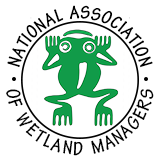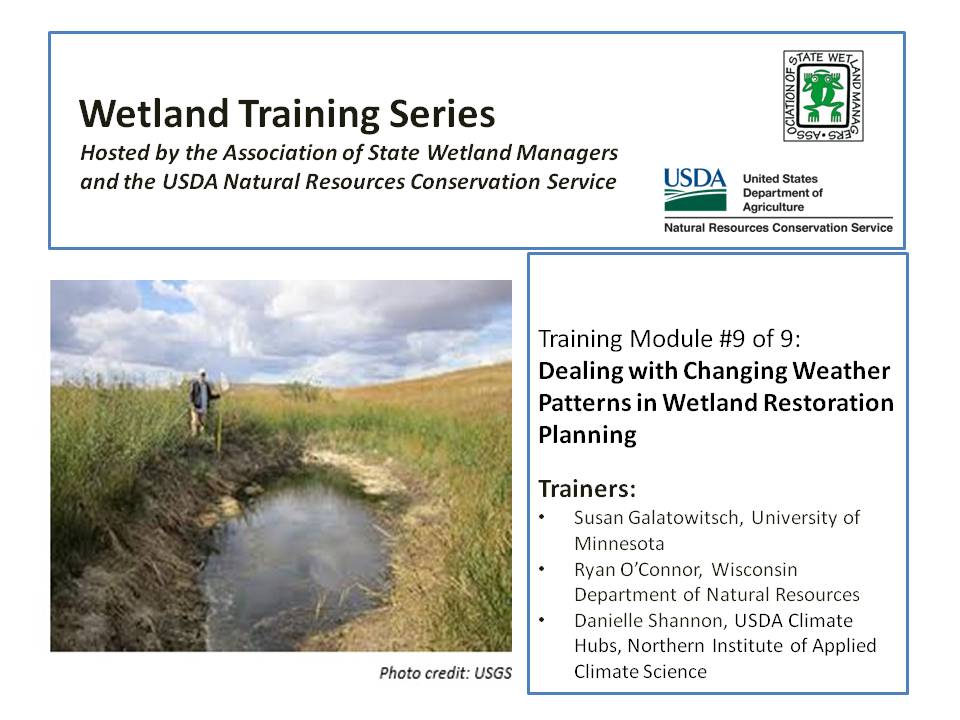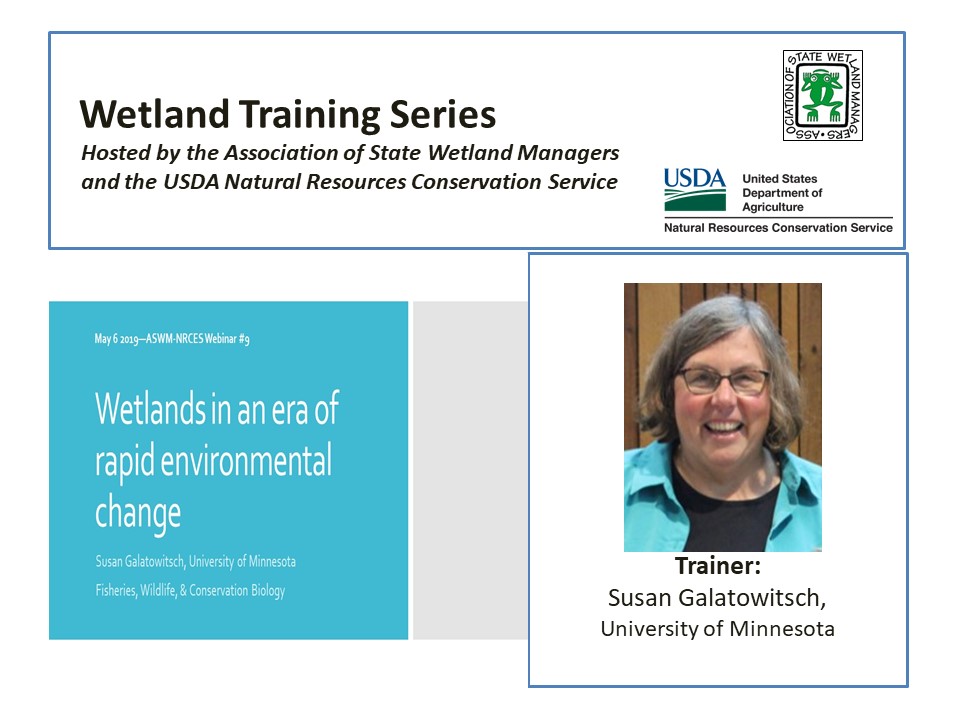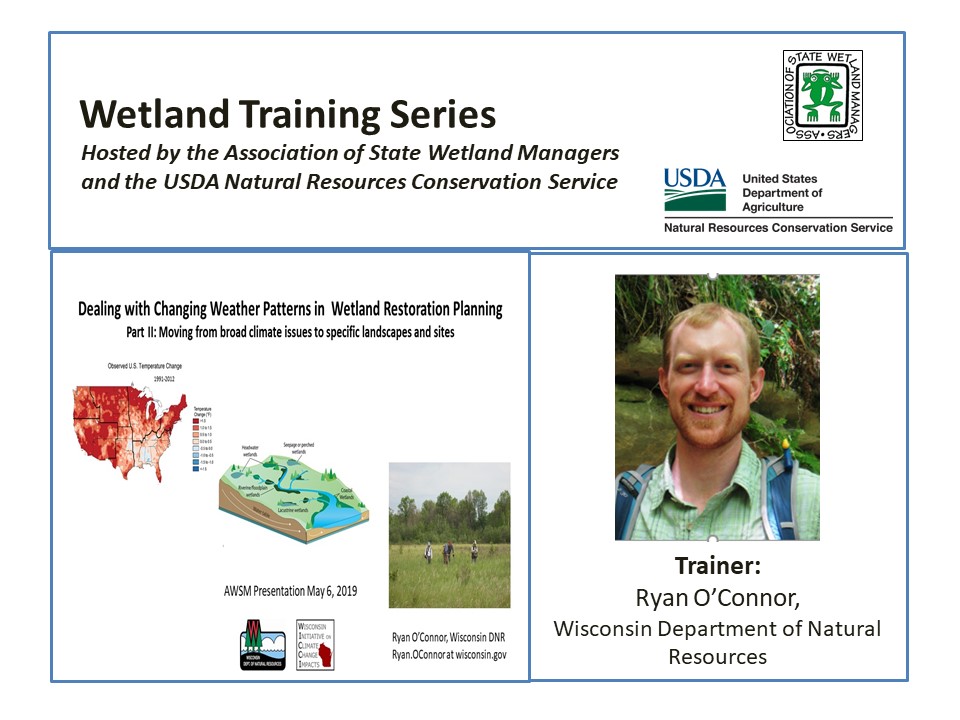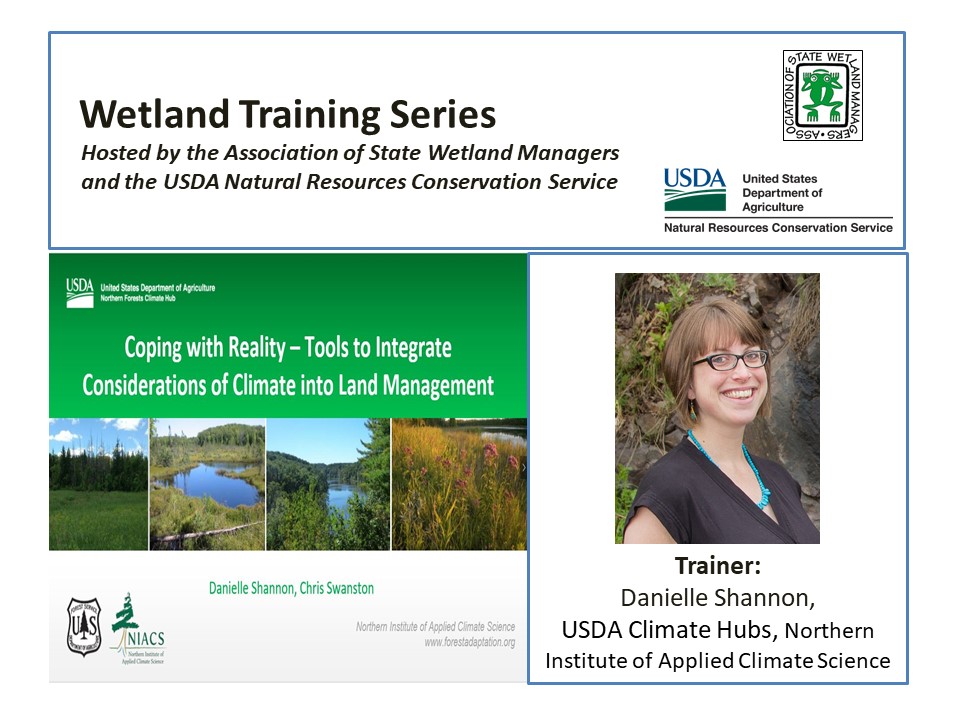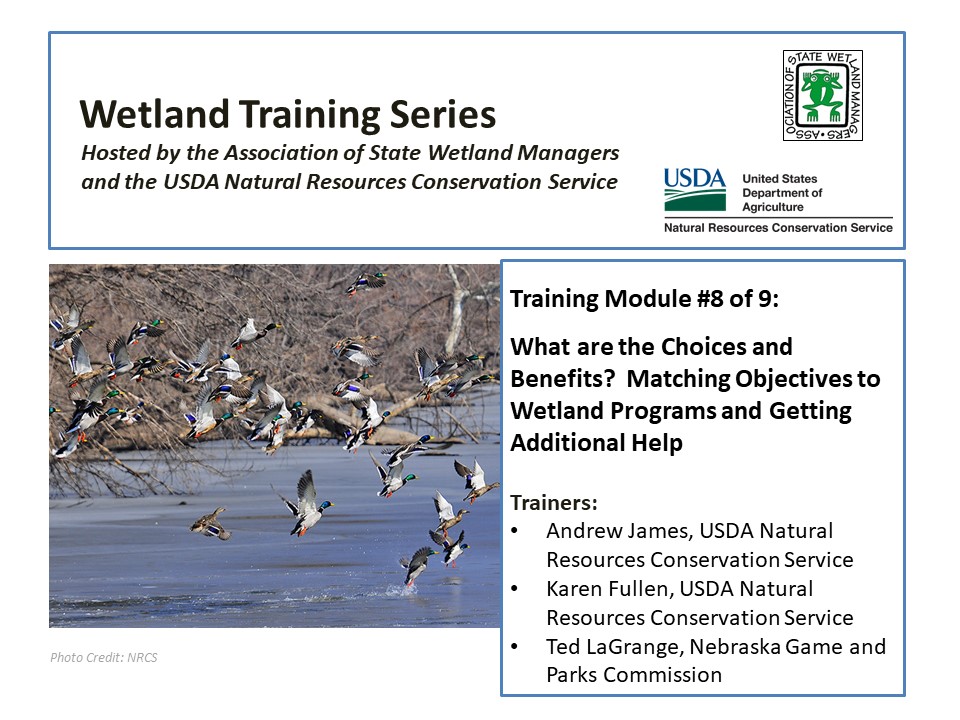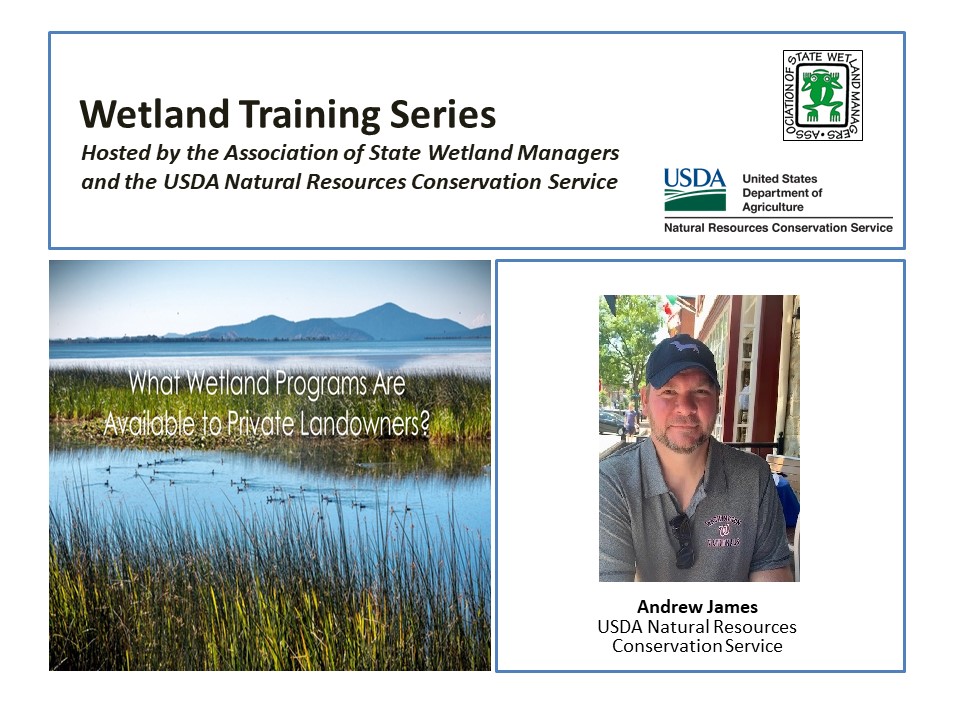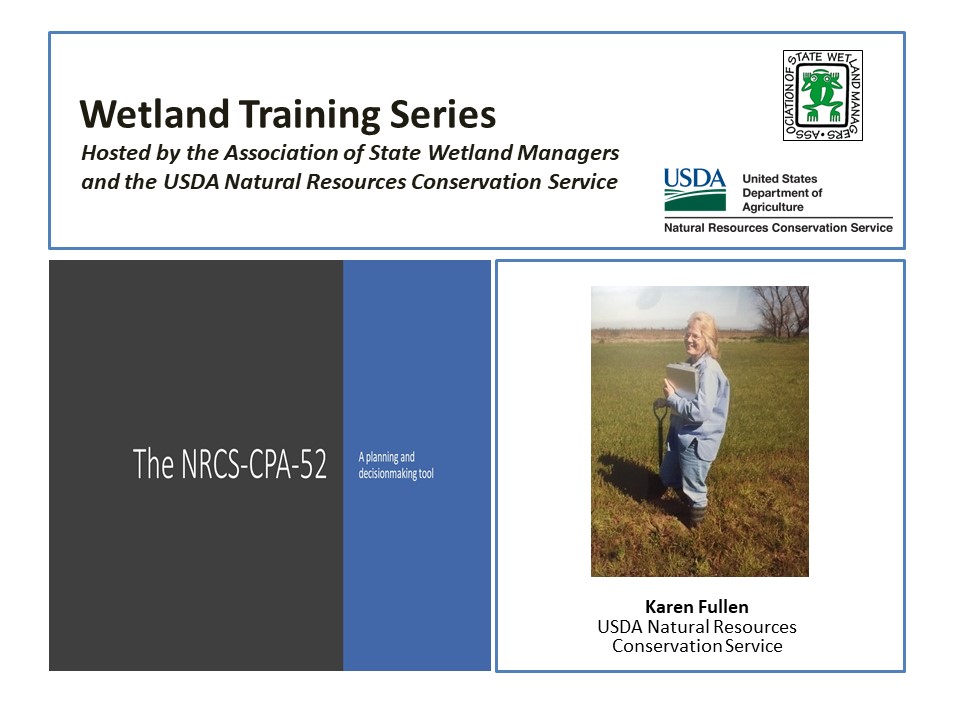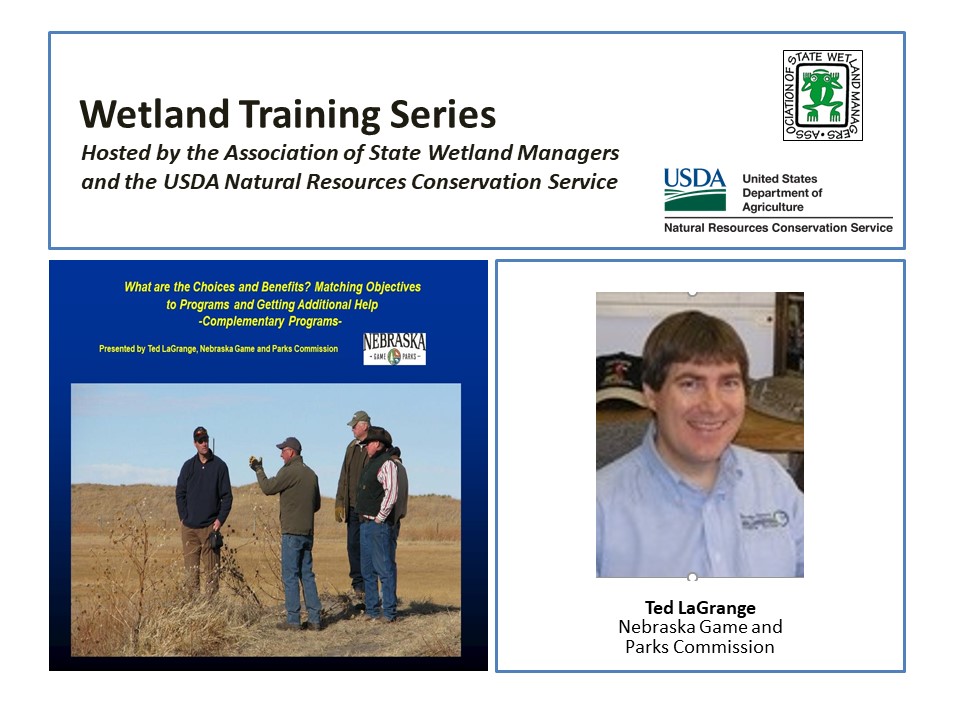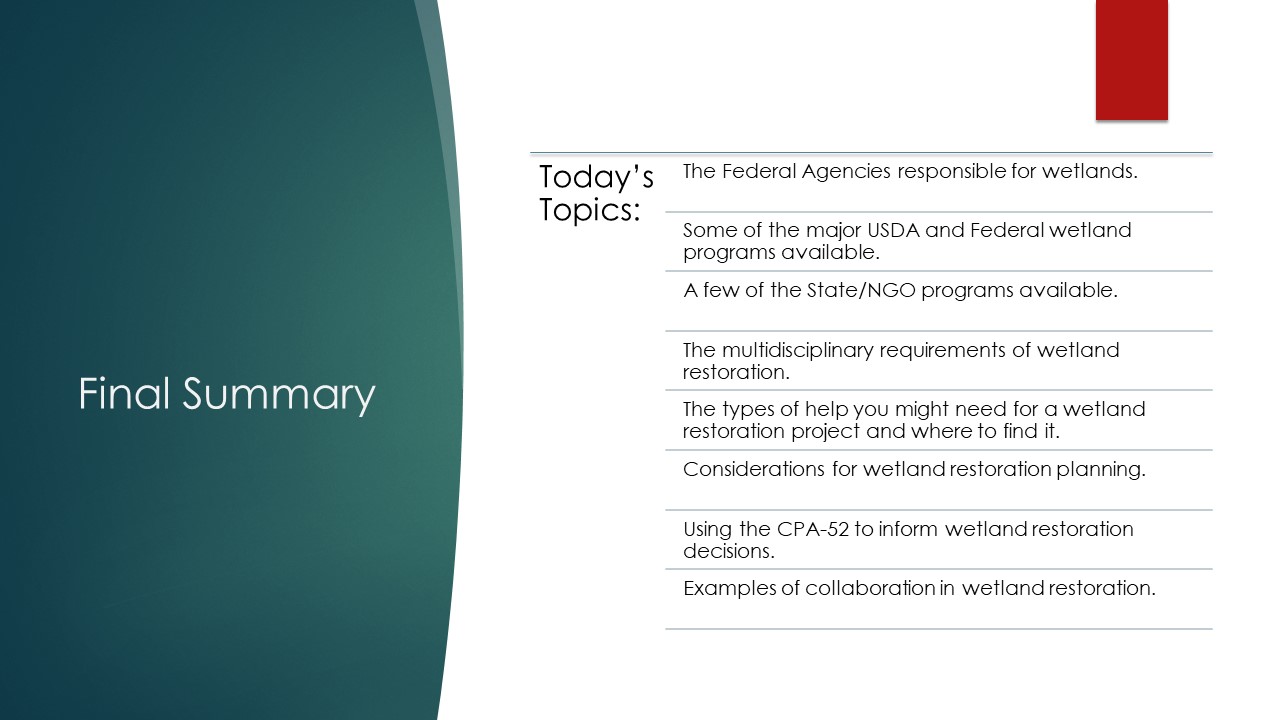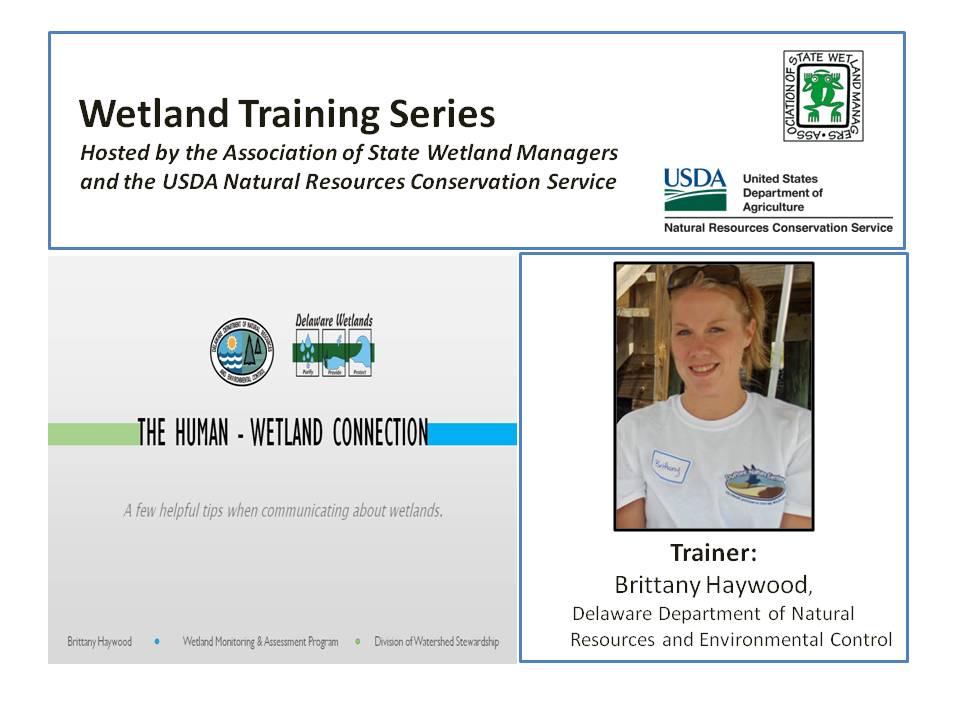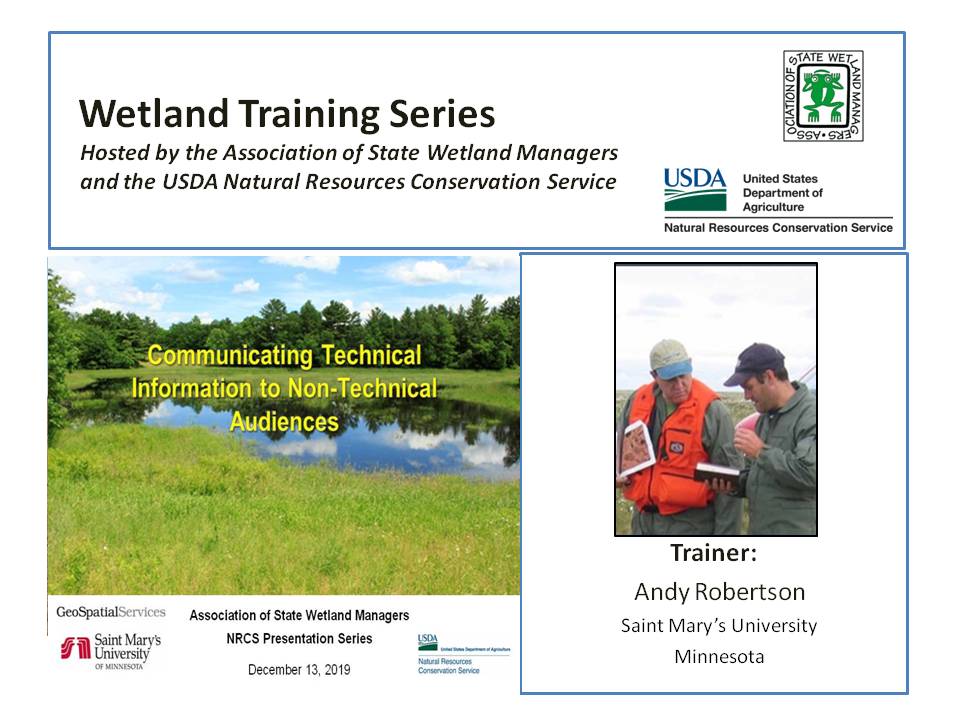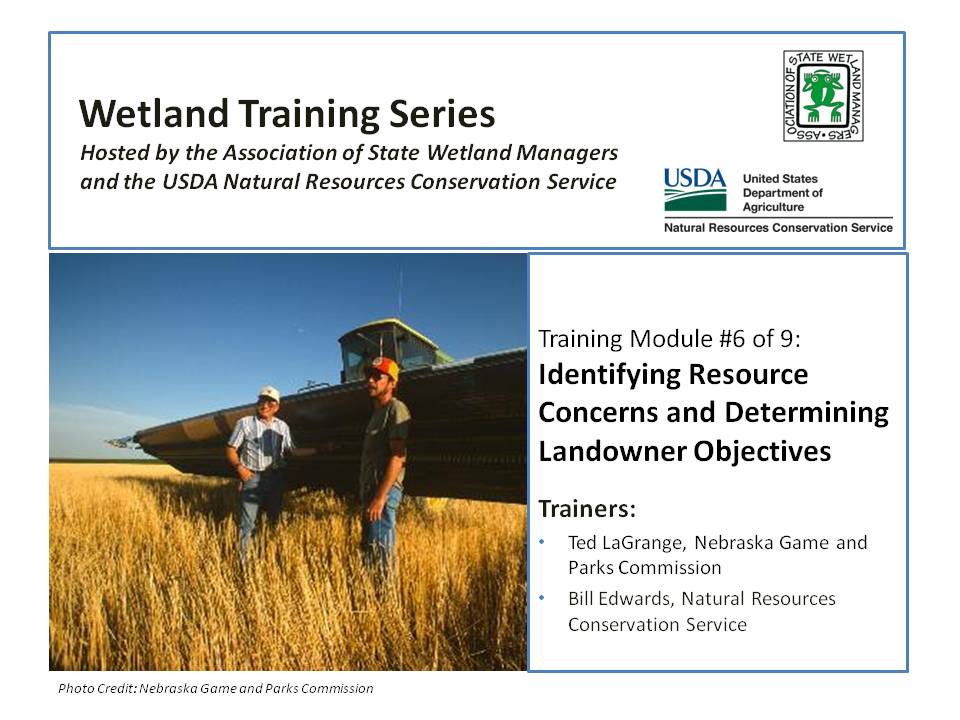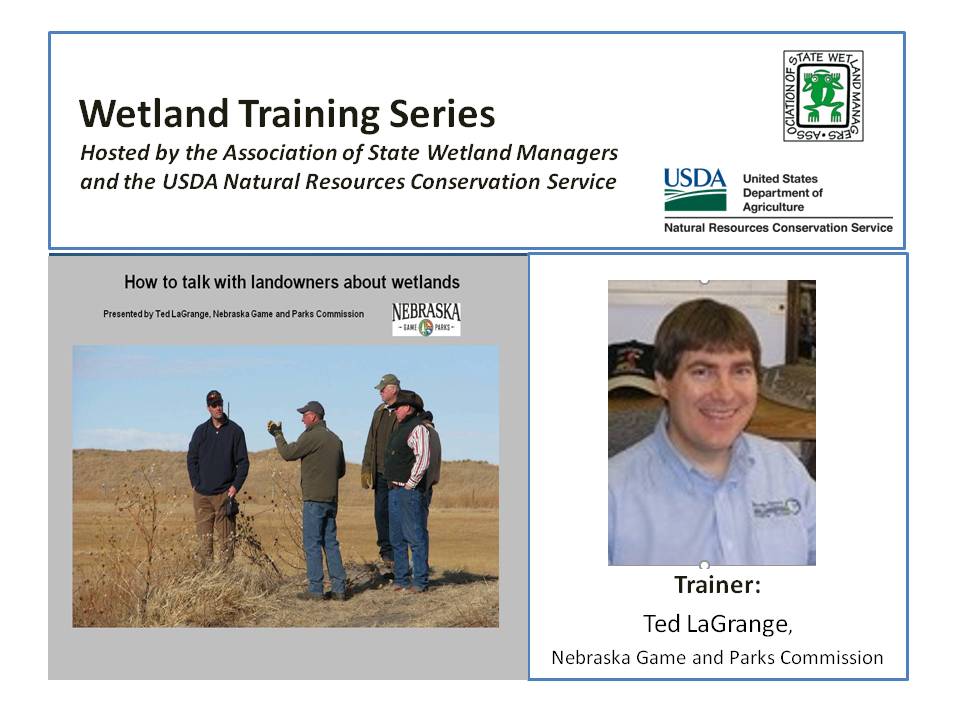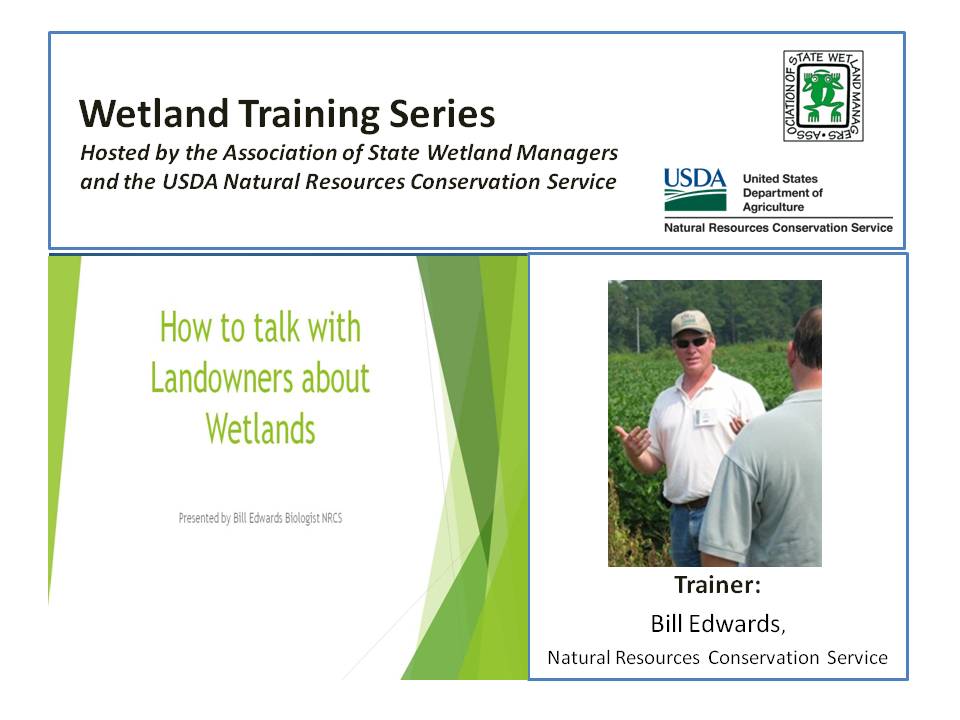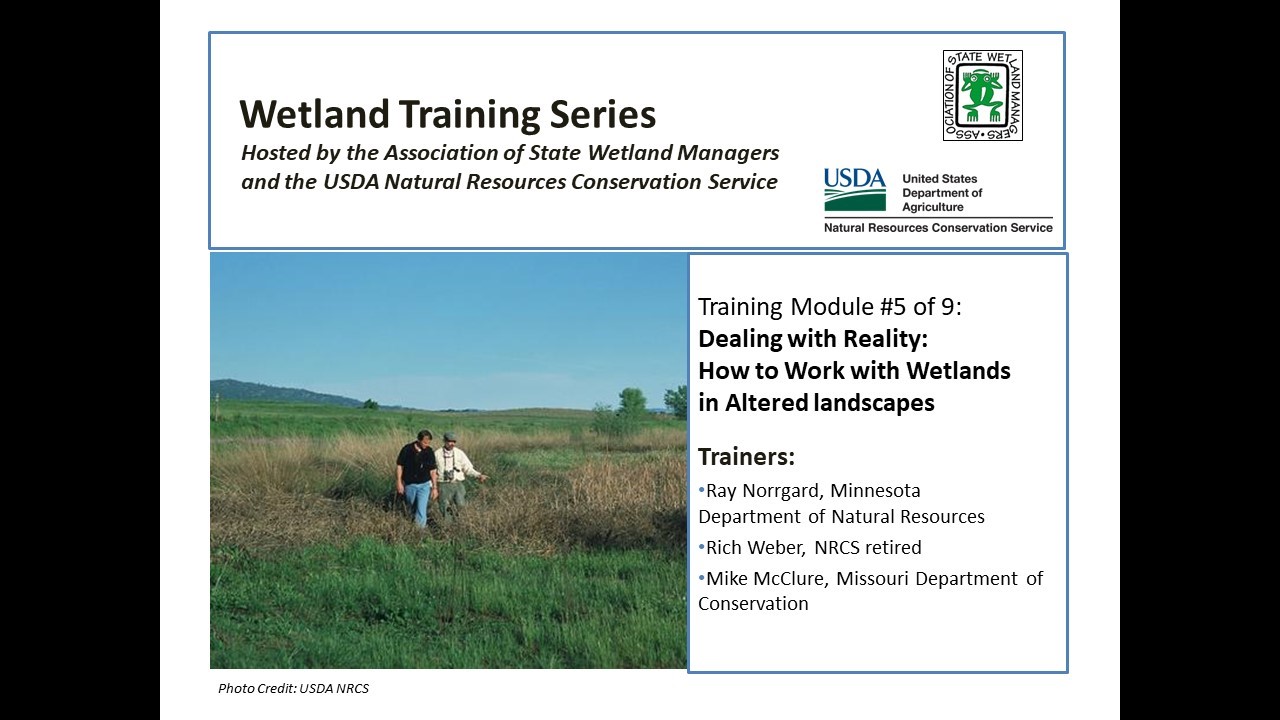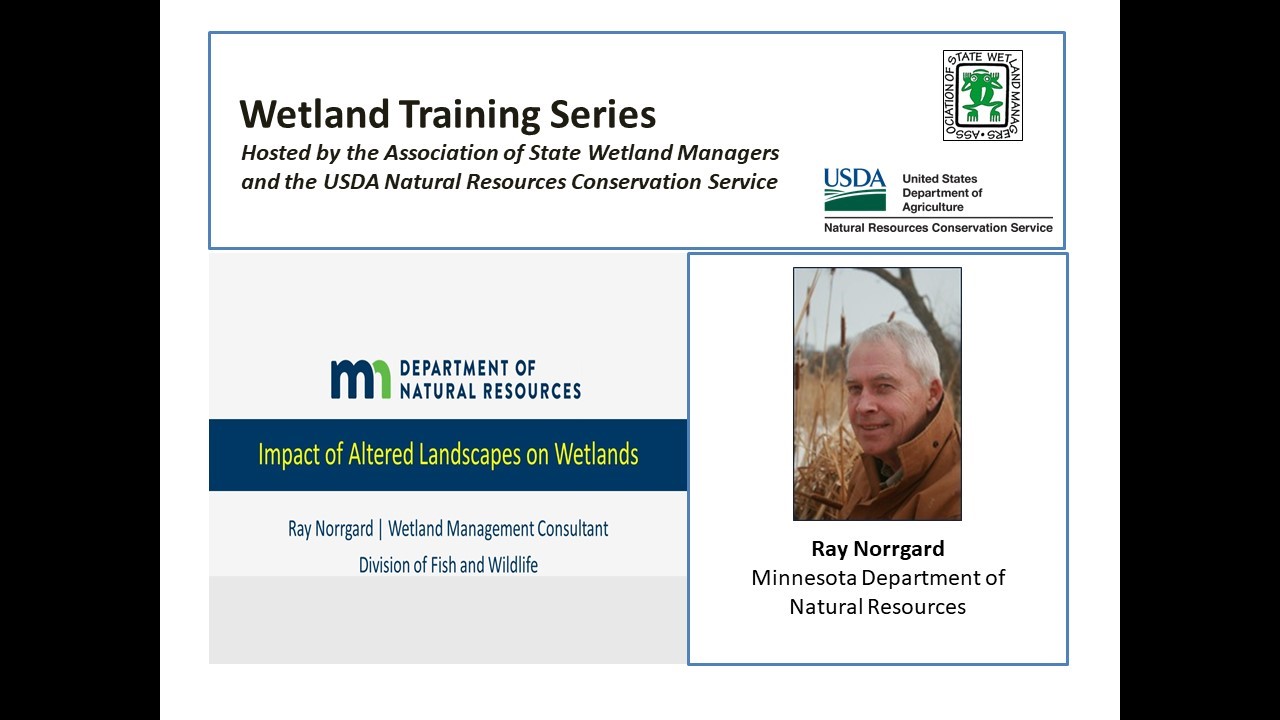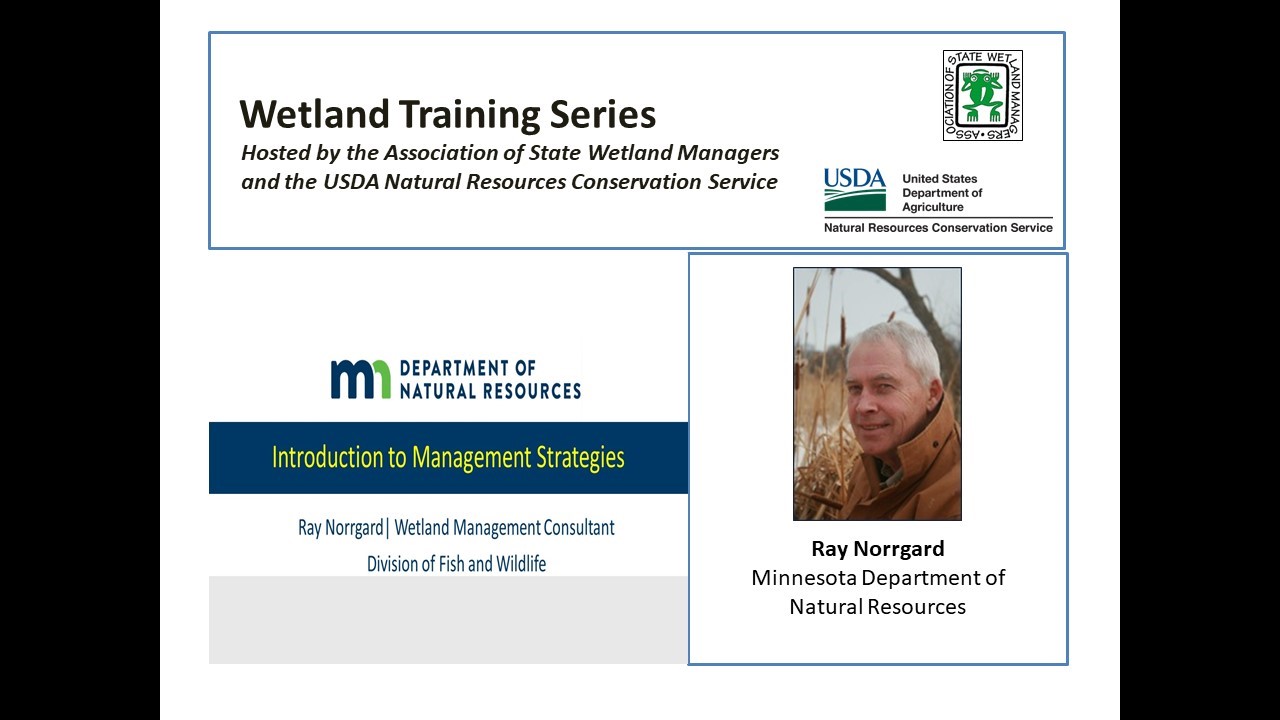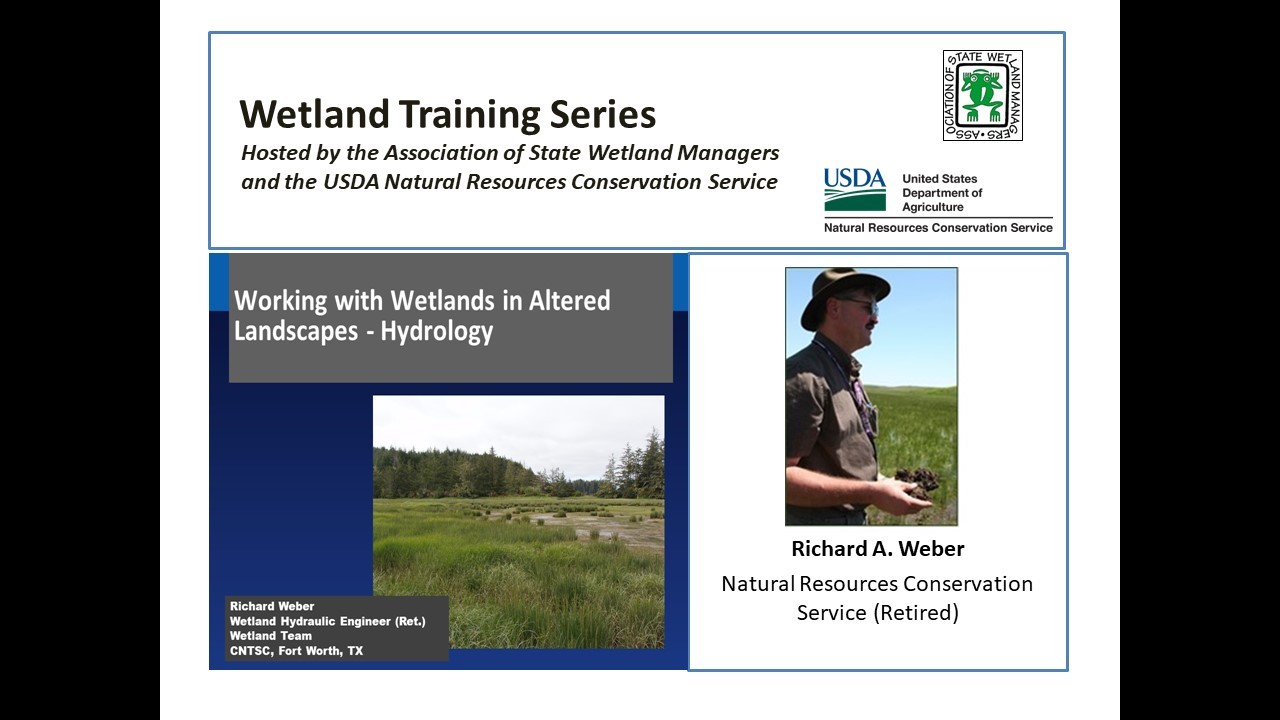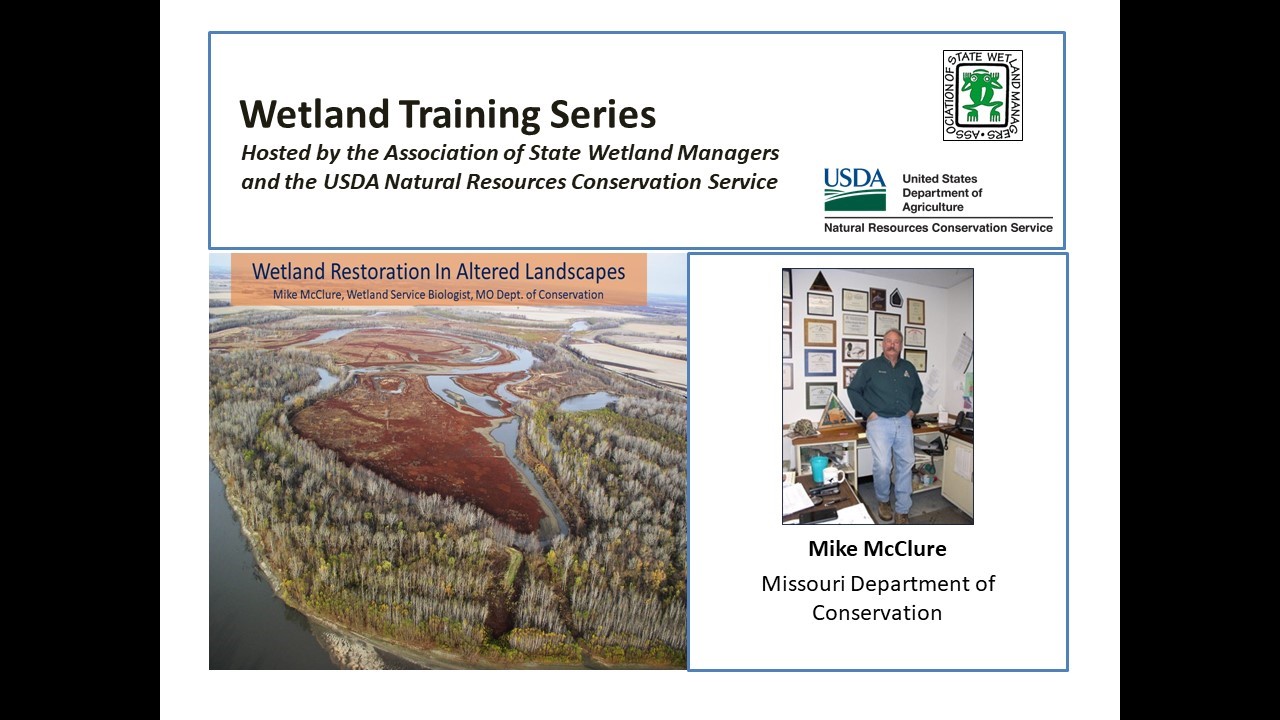Webinar 9: Dealing with Changing Weather Patterns in Wetland Restoration Planning
Held Monday, May 6, 2019 at 2:00-4:00 pm ET
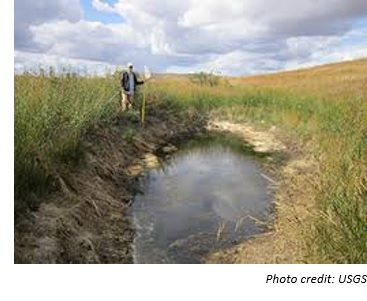 INTRODUCTION
INTRODUCTION
- Brenda Zollitsch, Senior Policy Analyst, National Association of Wetland Managers [POWERPOINT PRESENTATION]
PRESENTERS
- Susan Galatowitsch, University of Minnesota [POWERPOINT PRESENTATION]
- Ryan O’Connor, Wisconsin Department of Natural Resources [POWERPOINT PRESENTATION]
-
Danielle Shannon, USDA Climate Hubs, Northern Institute of Applied Climate Science (NIACS) [POWERPOINT PRESENTATION]
ABSTRACT
This is the sixth webinar in NAWM and NRCS’s jointly-developed nine-part wetland training webinar series. The webinar began with a look at how weather and climate are different, and how the climate has been changing and will continue to change over time. The webinar shared how these changes over time have affected wetlands and may continue to affect wetlands and decisions about their management. Moving from broad climate issues to specific regional/landscape issues, the second part of the webinar explored how additional complexity is caused by regional issues, water rights, coastal issues and more. Presentation of two illustrative case studies showed how decisions are affected by these issues in the real world. The final segment of the webinar focused on how conservation planners and others working with wetlands can use tools to integrate climate considerations into land management. The webinar closed with suggestions about ways to work with land managers to address climate at the site level and provide a decision-making framework for professionals working on these issues.
BIOS
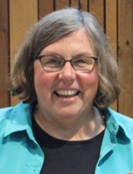 Susan Galatowitsch has been a faculty member of the University of Minnesota for 25 years and is professor and Head of the Department of Fisheries, Wildlife and Conservation Biology. She is a Fellow of the Society of Wetland Scientists, a member of Minnesota’s Academy of Distinguished Teachers, a past Fesler-Lampert Distinguished Chair of Urban and Regional Affairs, and a Fulbright Scholar to South Africa (University of Cape Town). Her research focuses on restoration of degraded wetlands and grasslands, climate change adaptation and management of invasive species in these systems. She served as the Director, Minnesota Aquatic Invasive Species Research Center for three years. In addition to 75 research publications, she has authored two books, Ecological Restoration (Sinauer Associates) and Restoring Prairie Wetlands: An Ecological Approach (with Arnold van der Valk). Dr. Galatowitsch has a PhD from Iowa State University.
Susan Galatowitsch has been a faculty member of the University of Minnesota for 25 years and is professor and Head of the Department of Fisheries, Wildlife and Conservation Biology. She is a Fellow of the Society of Wetland Scientists, a member of Minnesota’s Academy of Distinguished Teachers, a past Fesler-Lampert Distinguished Chair of Urban and Regional Affairs, and a Fulbright Scholar to South Africa (University of Cape Town). Her research focuses on restoration of degraded wetlands and grasslands, climate change adaptation and management of invasive species in these systems. She served as the Director, Minnesota Aquatic Invasive Species Research Center for three years. In addition to 75 research publications, she has authored two books, Ecological Restoration (Sinauer Associates) and Restoring Prairie Wetlands: An Ecological Approach (with Arnold van der Valk). Dr. Galatowitsch has a PhD from Iowa State University.
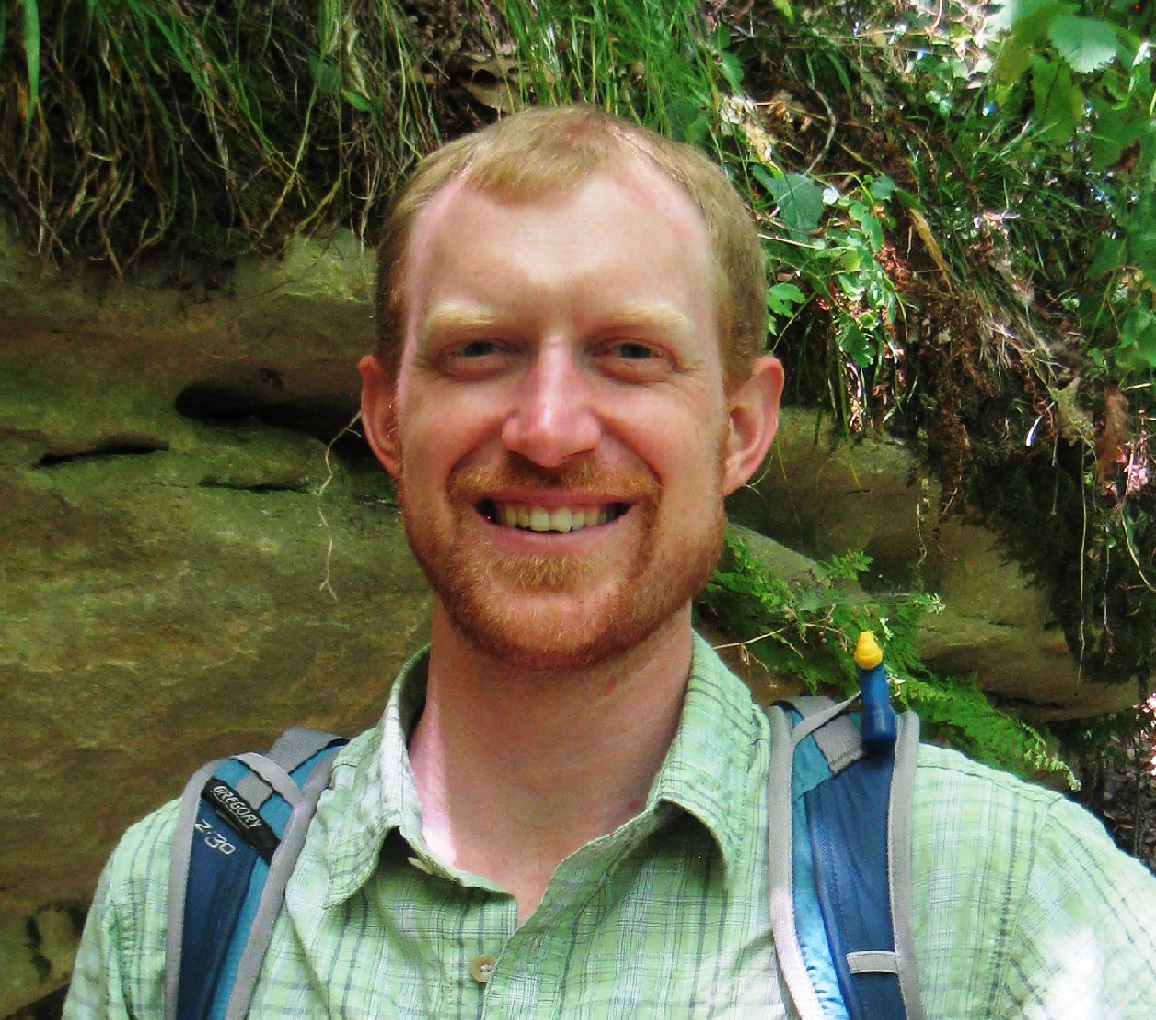 Ryan O’Connor is an ecologist and coordinates and conducts biotic inventories of natural communities for the Wisconsin DNR's Natural Heritage Inventory. His professional interests include providing land managers with high-quality data to make better decisions, developing adaptation resources, and hunting for rare and invasive plants. He also likes introducing his daughter to wetlands by looking for frogs, turtles, and a macroinvertebrate his daughter calls a "jitterbug".
Ryan O’Connor is an ecologist and coordinates and conducts biotic inventories of natural communities for the Wisconsin DNR's Natural Heritage Inventory. His professional interests include providing land managers with high-quality data to make better decisions, developing adaptation resources, and hunting for rare and invasive plants. He also likes introducing his daughter to wetlands by looking for frogs, turtles, and a macroinvertebrate his daughter calls a "jitterbug".
 Danielle Shannon is a Climate Adaptation Specialist at the Northern Institute of Applied Climate Science (NIACS), and the coordinator of the USDA Northern Forests Climate Hub. Danielle helps professional land managers cope with and adapt to the challenges of climate change and is expanding the suite of adaptation resources into the field of forest hydrology and the management of forested watersheds. Find more information about this effort at ForestAdaptation.org.
Danielle Shannon is a Climate Adaptation Specialist at the Northern Institute of Applied Climate Science (NIACS), and the coordinator of the USDA Northern Forests Climate Hub. Danielle helps professional land managers cope with and adapt to the challenges of climate change and is expanding the suite of adaptation resources into the field of forest hydrology and the management of forested watersheds. Find more information about this effort at ForestAdaptation.org.
![]()
Webinar 8: What are the Choices and Benefits? Matching Objectives to Programs and Getting Additional Help
Held Monday, August 5, 2019 - 3:00pm-5:00pm EDT
INTRODUCTION
- Brenda Zollitsch, Policy Analyst, National Association of Wetland Managers [POWERPOINT PRESENTATION]
PRESENTERS
• Andrew James, USDA Natural Resources Conservation Service [POWERPOINT PRESENTATION]
• Karen Fullen, USDA Natural Resources Conservation Service [POWERPOINT PRESENTATION]
• Ted LaGrange, Nebraska Game and Parks Commission [POWERPOINT PRESENTATION]
ABSTRACT
This seventh webinar in NAWM and NRCS’s jointly-developed nine-part wetland training webinar series began with a brief overview of USDA’s many wetland-related programs. The webinar introduced these programs and when planners should consider using them. This portion of the webinar also explored the complexity created by regional issues, water rights, coastal issues, changing weather patterns and other challenges that planners need to understand in order to make effective decisions when working with landowners. The second presentation shared the potential for using the CPA-52 environmental evaluation tool to assist in planning to assess concerns and alternatives. The webinar continued with a third presentation on partner organizations and programs that provide complementary supports for wetland work. The final presentation shared examples of collaborative projects around the country that have been built around different collaboration goals, form and functions. Throughout, the webinar they shared the importance of identifying and engaging additional help from both internal and external staff experts and advice on how to engage them. It also included discussion of terminology that is accessible by landowners around wetland and these complexities, as well as the interdisciplinary nature of the work.
BIOS
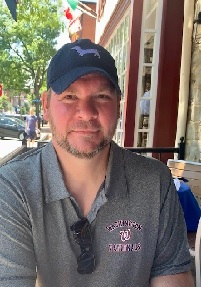 Andrew James is the Easement Programs Manager for Arkansas Natural Resource Conservation Service (NRCS) and Wetland Easement Restoration Planning and Implementation Leader with Louisiana NRCS. Since he first joined the NRCS in 2006 and from his first day on the job his career has revolved around wetland easements. included Andrew Joined the NRCS headquarters staff in 2012 as National Floodplain Easement Program Manager and Wetland Easement Specialist, and in 2014 he moved into the National WRE Program Manager position. Andrew’s career began with the Arkansas Game and Fish Commission when he was hired in 2003 as Manager of the Weddington Wildlife Management Area and shortly thereafter became the State Waterfowl Biologist, a position he filled until 2006. Andrew is a 1995 graduate of Louisiana Tech University where he majored in Wildlife Conservation and minored in Forestry, and a 2003 graduate of the USGS Cooperative Fish and Wildlife Unit at the University of Arkansas where he earned a MSc in Wildlife Biology.
Andrew James is the Easement Programs Manager for Arkansas Natural Resource Conservation Service (NRCS) and Wetland Easement Restoration Planning and Implementation Leader with Louisiana NRCS. Since he first joined the NRCS in 2006 and from his first day on the job his career has revolved around wetland easements. included Andrew Joined the NRCS headquarters staff in 2012 as National Floodplain Easement Program Manager and Wetland Easement Specialist, and in 2014 he moved into the National WRE Program Manager position. Andrew’s career began with the Arkansas Game and Fish Commission when he was hired in 2003 as Manager of the Weddington Wildlife Management Area and shortly thereafter became the State Waterfowl Biologist, a position he filled until 2006. Andrew is a 1995 graduate of Louisiana Tech University where he majored in Wildlife Conservation and minored in Forestry, and a 2003 graduate of the USGS Cooperative Fish and Wildlife Unit at the University of Arkansas where he earned a MSc in Wildlife Biology.
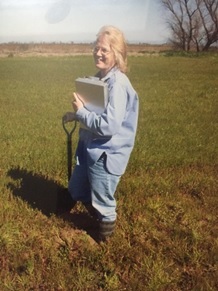 Karen Fullen is the Ecologist and Environmental Compliance Specialist for USDA’s Natural Resources Conservation Service West Region. A native of Fresno, California, Karen started her NRCS career in the Field Office there in 1992 in the student employment programs. After obtaining an A.S. degree in Forest/Park Technology from Kings River Community College and a B.S. in Biology with an Ecology emphasis from Fresno State in 1997, Karen became a Soil Conservationist for the Fresno Field Office. From 1999-2004, she was the Wetland Team Biologist working out of the Elk Grove Field Office to provide wetland compliance and restoration assistance across a large swath of interior northern California. Prior to joining the West National Technology Support Center Core Team in 2014, Karen Fullen served as the State Biologist and Environmental Compliance Specialist for Idaho and Utah over a period of 10 years.
Karen Fullen is the Ecologist and Environmental Compliance Specialist for USDA’s Natural Resources Conservation Service West Region. A native of Fresno, California, Karen started her NRCS career in the Field Office there in 1992 in the student employment programs. After obtaining an A.S. degree in Forest/Park Technology from Kings River Community College and a B.S. in Biology with an Ecology emphasis from Fresno State in 1997, Karen became a Soil Conservationist for the Fresno Field Office. From 1999-2004, she was the Wetland Team Biologist working out of the Elk Grove Field Office to provide wetland compliance and restoration assistance across a large swath of interior northern California. Prior to joining the West National Technology Support Center Core Team in 2014, Karen Fullen served as the State Biologist and Environmental Compliance Specialist for Idaho and Utah over a period of 10 years.
 Ted LaGrange has worked as the Wetland Program Manager for the Nebraska Game and Parks Commission for 25 years. As Wetland Program Manager he works on a wide variety of wetland issues throughout Nebraska including partnerships, private land restoration programs, public lands management, research, regulations, and outreach. Prior to moving to Nebraska, he worked for 8 years as a Waterfowl Research Technician for the Iowa Department of Natural Resources. Ted received B.S. and M.S. degrees in Wildlife Biology from Iowa State University. His professional interests are in prairie wetlands and waterfowl/waterbird ecology.
Ted LaGrange has worked as the Wetland Program Manager for the Nebraska Game and Parks Commission for 25 years. As Wetland Program Manager he works on a wide variety of wetland issues throughout Nebraska including partnerships, private land restoration programs, public lands management, research, regulations, and outreach. Prior to moving to Nebraska, he worked for 8 years as a Waterfowl Research Technician for the Iowa Department of Natural Resources. Ted received B.S. and M.S. degrees in Wildlife Biology from Iowa State University. His professional interests are in prairie wetlands and waterfowl/waterbird ecology.
![]()
Webinar 7: How to Talk about Wetlands with Landowners
Presentations Recorded December 2019 (Non-Live Webinar)![]()
INTRODUCTION
- Brenda Zollitsch, Policy Analyst, National Association of Wetland Managers
TRAINERS
- Brittany Haywood, Delaware Department of Natural Resources
- Andy Robertson, Saint Mary’s University of Minnesota
![]()
Webinar 6: Identifying Resource Concerns and Determining Landowner Objectives
Presentations Recorded December 2019 (Non-Live Webinar)![]()
INTRODUCTION
- Brenda Zollitsch, Policy Analyst, National Association of Wetland Managers
TRAINERS
- Ted LaGrange, Nebraska Game and Parks Commission
- Bill Edwards, Natural Resources Conservation Service
Webinar 5: Dealing with Reality: How to Work with Wetlands in Altered landscapes
Held Friday, February 15, 2019 at 3:00-5:00 pm ET
INTRODUCTION
- Brenda Zollitsch, Policy Analyst, National Association of Wetland Managers [PowerPoint Presentation [POWERPOINT PRESENTATION]
TRAINERS
- Ray Norrgard, Minnesota Department of Natural Resources
[POWERPOINT PRESENTATION] [POWERPOINT PRESENTATION] - Rich Weber, NRCS retired [POWERPOINT PRESENTATION]
- Mike McClure, Missouri Department of Conservation [POWERPOINT PRESENTATION]
ABSTRACT
This is the fifth webinar in NAWM and NRCS’s jointly-developed nine-part wetland training webinar series. The webinar began with a presentation on types of actions taken that have altered, degraded or destroyed wetlands over time. This was followed by a discussion on how hydrology, source water, water budgets and the soil/water interfaces vary by the location and wetland type (Hydrogeomorphic (HGM) class) and how adjustments to these lead to changes in wetlands. NRCS definitions of actions that can be taken to improve wetlands will be shared. The third talk covered the concepts of how restoration, enhancement, and creation can support improved wetland health and waterfowl productivity, looking primarily at the prairie potholes. The final presentation discussed how to start with a watershed perspective to identify good management options on an individual property and introduce specific actions that can be taken working in conjunction with a landowner to improve wetland health. Participants will come away from the webinar with an increased understanding of the extent of wetland alteration, concepts to support understanding wetland variability, management options for returning wetlands to the land and supporting wetland health.
BIOS
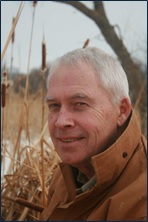 Ray Norrgard, is Minnesota born, raised, and educated; Ray has served as a wildlife professional for state, federal, and nongovernmental agencies for more than four decades. His primary focus throughout his career has been waterfowl, wetlands, shallow lakes, and education. He is currently focused on providing wetland management technical guidance to wildlife field managers with the Minnesota Department of Natural Resources.
Ray Norrgard, is Minnesota born, raised, and educated; Ray has served as a wildlife professional for state, federal, and nongovernmental agencies for more than four decades. His primary focus throughout his career has been waterfowl, wetlands, shallow lakes, and education. He is currently focused on providing wetland management technical guidance to wildlife field managers with the Minnesota Department of Natural Resources.
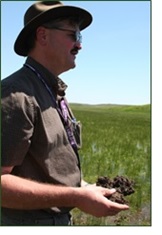 Richard A. Weber was a Wetland Hydraulic Engineer with the USDA Natural Resources Conservation Service (NRCS), Wetland Team, CNTSC in Fort Worth, Texas from 2006 to 2017. In this role, Rich provided national leadership on wetland hydrology, including: Support for Wetland Restoration Program, Wetland Protection Policy, and E.O. 11990 Wetland Assessments. He led a national training cadre for Wetland Restoration and Enhancement and Hydrology Tools for Wetland Determination courses. From 2005-2006, Rich was Design Engineer at the NRCS Nebraska State Office where he had design and A&E Contracting responsibilities for PL-566, WRP, and EQIP programs. From 1999-2005, he was a Field Engineer at the NRCS in the Scottsbluff, NE Field Office where he had design, construction, and contracting responsibilities for the Wetland Reserve Program, EQIP Irrigation and Animal Waste Management, and CTA conservation practices. From 1997-1999, Rich was an Agricultural Engineer at the NRCS in Chehalis, WA where he had design, construction, and contracting responsibilities for Conservation District funded Stream Restoration and Fish Passage projects, and EQIP program
Richard A. Weber was a Wetland Hydraulic Engineer with the USDA Natural Resources Conservation Service (NRCS), Wetland Team, CNTSC in Fort Worth, Texas from 2006 to 2017. In this role, Rich provided national leadership on wetland hydrology, including: Support for Wetland Restoration Program, Wetland Protection Policy, and E.O. 11990 Wetland Assessments. He led a national training cadre for Wetland Restoration and Enhancement and Hydrology Tools for Wetland Determination courses. From 2005-2006, Rich was Design Engineer at the NRCS Nebraska State Office where he had design and A&E Contracting responsibilities for PL-566, WRP, and EQIP programs. From 1999-2005, he was a Field Engineer at the NRCS in the Scottsbluff, NE Field Office where he had design, construction, and contracting responsibilities for the Wetland Reserve Program, EQIP Irrigation and Animal Waste Management, and CTA conservation practices. From 1997-1999, Rich was an Agricultural Engineer at the NRCS in Chehalis, WA where he had design, construction, and contracting responsibilities for Conservation District funded Stream Restoration and Fish Passage projects, and EQIP program 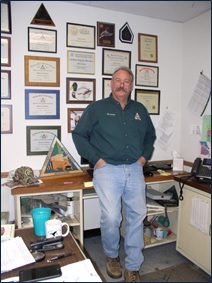 Animal Waste Projects. And from 1986-1997, he was a Watershed Project Engineer at the NRCS in Horton, KS where he performed Construction Contract Administration for PL-566 Watershed Protection and Flood Prevention projects. Currently, he performs contract work for the Kansas Alliance for Wetlands and Streams, Ducks Unlimited, and KLA Environmental Services.
Animal Waste Projects. And from 1986-1997, he was a Watershed Project Engineer at the NRCS in Horton, KS where he performed Construction Contract Administration for PL-566 Watershed Protection and Flood Prevention projects. Currently, he performs contract work for the Kansas Alliance for Wetlands and Streams, Ducks Unlimited, and KLA Environmental Services.
Mike McClure is a Missouri Department of Conservation Wetland Service Biologist. Mike served in a wetland management position on MDC’s Grand Pass Conservation Area from 1987 to April 1997. Since then, Mike has served as the biologist on the NRCS Wetland Emphasis Team-Chillicothe, where his responsibilities focus on development of WRP/WRE restoration plans and wetland management plans for wetlands restored under WRP/WRE.
![]() View Past 2019 NRCS Conservation Planners Training Webinars Here
View Past 2019 NRCS Conservation Planners Training Webinars Here
View a List of Past 2019 NRCS Conservation Planners Training Webinar Recordings Here
